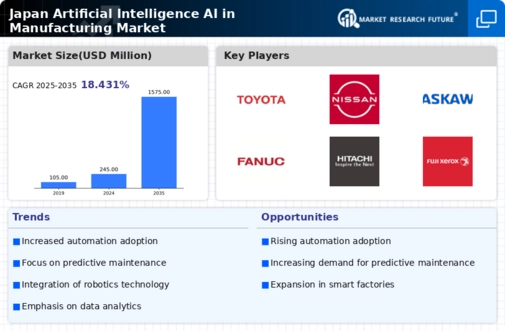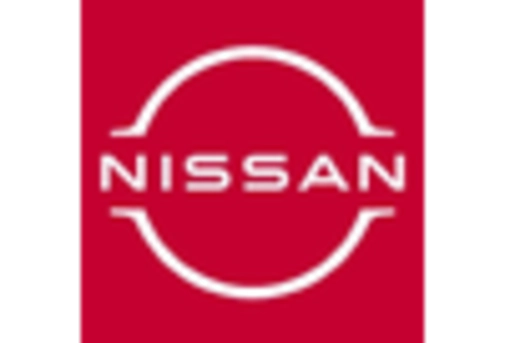Advancements in AI Technologies
The rapid advancements in AI technologies are propelling the Japan artificial intelligence in manufacturing market forward. Innovations in machine learning, computer vision, and robotics are enabling manufacturers to implement more sophisticated AI solutions. These technologies allow for improved automation, predictive analytics, and enhanced decision-making processes. For instance, the use of AI-driven robotics in assembly lines has shown to increase efficiency by up to 40%. As these technologies continue to evolve, they are likely to create new opportunities for manufacturers to optimize their operations and reduce costs. The ongoing research and development in AI signify a promising future for the manufacturing sector in Japan.
Growing Focus on Quality Control
Quality control remains a paramount concern within the Japan artificial intelligence in manufacturing market. The integration of AI technologies facilitates advanced quality assurance processes, which are essential for maintaining high standards in production. AI-driven systems can analyze vast amounts of data to identify defects and anomalies in real-time, thereby reducing waste and improving product quality. Recent studies indicate that manufacturers utilizing AI for quality control have seen a 30% reduction in defects. This focus on quality not only enhances customer satisfaction but also strengthens brand reputation, making it a vital driver for AI adoption in the manufacturing sector.
Government Initiatives and Support
The Japan artificial intelligence in manufacturing market benefits significantly from government initiatives aimed at promoting AI adoption. The Japanese government has launched various programs to support the integration of AI technologies in manufacturing. For instance, the 'Society 5.0' initiative emphasizes the importance of digital transformation across industries, including manufacturing. This initiative encourages collaboration between public and private sectors, fostering an environment conducive to innovation. Furthermore, financial incentives and grants are available for companies investing in AI solutions, which could potentially accelerate the adoption rate. Such government backing not only enhances the credibility of AI technologies but also encourages manufacturers to explore and implement AI-driven solutions.
Labor Shortages and Workforce Transformation
Japan's manufacturing sector is currently grappling with labor shortages, which is a significant driver for the Japan artificial intelligence in manufacturing market. As the workforce ages and fewer young individuals enter the manufacturing field, companies are increasingly turning to AI solutions to fill the gaps. AI technologies can automate repetitive tasks, allowing human workers to focus on more complex and value-added activities. This transformation not only addresses labor shortages but also enhances overall productivity. It is estimated that by 2026, AI could potentially augment the capabilities of the existing workforce, leading to a more efficient manufacturing environment.
Rising Demand for Smart Manufacturing Solutions
The Japan artificial intelligence in manufacturing market is experiencing a notable surge in demand for smart manufacturing solutions. This trend is driven by the need for enhanced operational efficiency and productivity. According to recent data, approximately 60% of manufacturers in Japan are actively investing in AI technologies to optimize their production processes. The integration of AI enables real-time data analysis, which facilitates informed decision-making and reduces downtime. As companies strive to remain competitive in a global market, the adoption of smart manufacturing solutions appears to be a critical strategy. This shift not only enhances productivity but also aligns with Japan's broader goals of innovation and technological advancement in the manufacturing sector.
























